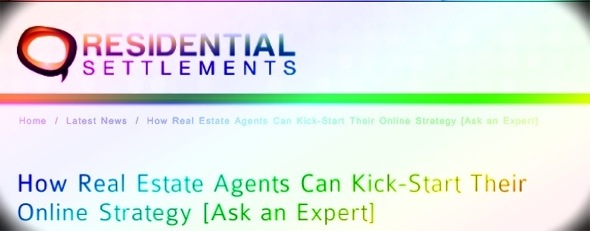
This post appeared first on ResidentialSettlements.com.au: an interview with me about real estate Internet marketing…
As manager for reiwa.com, Charlie Gunningham is switched on when it comes to the ins and outs of online marketing.
Below, he reveals the biggest marketing mistakes real estate agents are making, and how agents can get social media and real estate websites working for them.
What is the typical marketing strategy for real estate?
There is no typical agent’s marketing strategy, and I am sure everyone does something slightly different, based on what has worked for them in the past, what is right for the particular property (every home is unique) and how much budget they can work with.
Undoubtedly, the big change over the past decade has been the rise of internet marketing. I was fortunate to get into this area in the late 1990s and saw it rise from an insignificant thing to complete dominance. Today, buyers and renters go first to the web, and the web gives agents 80% or more of their total leads. While some agents have shifted more and more marketing spend towards the ‘Net, there is still much more to be done in this regard with old habits dying slowly, and lots of marketing dollars wasted. Two years ago, I calculated that $1bn of advertising dollars by real estate agents was pretty much wasted on non productive areas. Of course, it is glib to make such a comment, but real estate is the second largest spender of advertising dollars (beaten only by fast food ads) in Australia. More is (collectively) spent advertising homes than spent on advertising banks, cars or food.
The smarter agents, and the ones that are making most headway, are advertising (of course) on all the major real estate web sites, have a good agency site, are using a bit of social media (a blog on their own site, a facebook community page, a twitter account, maybe using foursquare or instagram). Yes, they do some offline stuff too, and that complements things (but remember where 80% of their leads and enquiries are coming from).
What will be the main trends over the next 5 years?
Who can know, for sure? I read just this week that apps may replace the web. Already, there is a group of people who go first to apps, and love their speed and reliability, rather than struggle with low connectivity with sites on their smartphones or badly done mobile sites. Agencies may have to consider having an app built sometime over the next few years, and in that, there are many choices – a native app (made specifically for Android of iPhone) or web app? Html5 or what? HTML5 is still new and untested, and cannot offer (yet) all the options of a well made native app.
I feel sure that newspaper advertising will decline further over the next 5 years; and the web, social media (and maybe apps) will take over. Video will become more important. Allied to the NBN rollout, all our internet speeds are going to increase, and can handle more video streaming.
Whatever happens, you do need to be out there taking advantage of these new technologies. Because where the eyeballs are, that is where agents will need to be marketing.
What are some of the mistakes real estate agents make?
1. Spamming people on Twitter or Facebook with their listings – people hate that. That’s like walking up to random people in the supermarket and shouting at them “do you wanna buy this house?!!!!” Ridiculous.
2. Withholding important information about their listings – like price or address. People come to the internet for information, don’t give it to them and it really annoys them. Worse, they don’t look any further with you, and you don’t get the lead.
3. Not following up. If people enquire, reply, and professionally. Yes, it can be a bit impersonal, but have some default copy and paste replies if you want to save time – but always reply, and follow up.
4.Bad photos, poorly spelt/written text, fuzzy floor plans… unprofessional!
How can real estate agents not make these mistakes?
1. Use social media for what it is intended for – connecting, adding value, meeting people – not for selling primarily. Selling can happen, but only after you have connected. It’s like a networking event.
2. Give information away. The more you give, the more shall be returned. It works!
3. Follow up, on everything. It is about how you respond, your customer service, it’s still a human person you are emailing and who has contacted you.
4. Always use good photos – the web is a visual medium, people will look at photos first, and flick through them – give them 12-20 or so. No excuse for no photos, or just one or two. Short, well written vibrant copy. Floor Plans are popular with web users. Make all this presentation exemplary. First impressions also count on the web.
What are your recommendations for Internet marketing?
Like any marketing strategy, it needs to evolve over time. There are no hard and fast rules, but as in anything, try a million things and keep what works. Do what you can do well, and execute your plans well. Keep learning, go on courses, breakfasts, seminars, read blogs, observe what others do. Keep it simple, clean, precise and smart.
People are making an emotional, stressful purchase/rental, so help them with their move. That, in essence, is what you do.
Thanks Charlie


I think nowadays real-estate companies are also growing their business in internet markets.